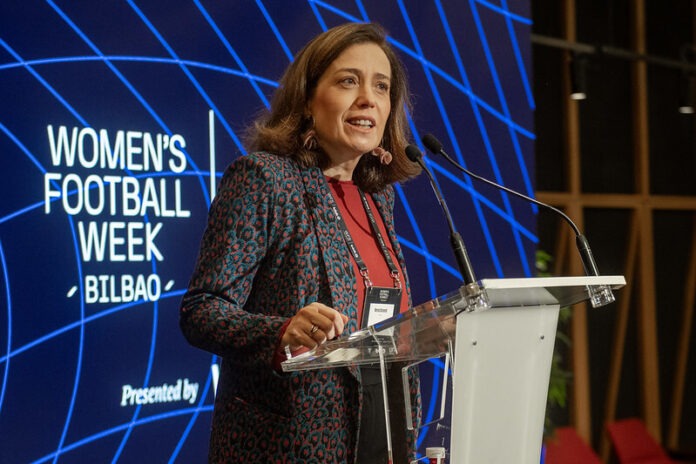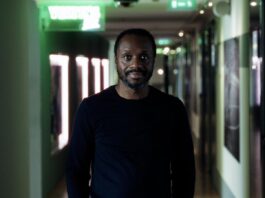
Marian Otamendi is not only the Co-Founder and CEO of World Football Summit, but also one of the most influential voices shaping the future of the game. With her international background, a strong vision for sustainability, inclusion, and gender equality, and a deep understanding of football’s economic and social dimensions, she has turned WFS into a truly global platform that connects decision-makers from every corner of the industry.
In this conversation with The Football Week, she shares her insights on the rapid growth of women’s football, her personal journey as a female leader in a traditionally male-dominated space, and why she firmly believes football has the power to drive meaningful social change.
Our Exclusive Interview with Marian Otamendi
Part I – Women’s Football & the World Football Summit
Women’s football has been experiencing remarkable growth worldwide. How is the World Football Summit contributing to ensuring that this momentum extends beyond the pitch and into leadership, sponsorship, and media visibility?
It is key indeed that the momentum is sustained in time and that it impacts not just women on the pitch but also the entire football ecosystem.
Our ESG department, with Gender Equality as a main pillar, has the mission to ensure that women are present and have strong voices at every level of the game and to improve the growth, impact and visibility of women’s football and women in football and sports in general.
Our Female Leaders Program, for example, provides dedicated spaces and activities for women – both emerging professionals and pioneers – to connect, exchange insights, and build robust networks.
Our target is to have at least 30% women speakers and 20% women attendees at our events. So a few years ago, we created our Female Leaders Pass, a special discount designed to increase female representation in all of our events. The future of football is discussed and decided at World Football Summit – and women need to be part of the conversation and claim their place in the industry.
And continuous visibility is essential for us. Rather than limiting recognition to International Women’s Day, we work year-round to highlight women in sports via our panels, editorial content, podcasts, activations, education grants.
WFS has launched initiatives such as the Female Leaders Program and Project Menina to empower women in football. Could you share some tangible outcomes or success stories that you are particularly proud of?
There are several outcomes I’m particularly proud of. Since 2022, for example, we’ve surpassed our target of 30 percent female speakers at WFS Europe, reaching 34 percent, which demonstrates the effectiveness of our efforts to amplify women’s voices on the global stage.
Our Female Leaders Gatherings, which we’ve taken to Europe, Africa, Asia and the Americas, have become a powerful platform for peer-to-peer support during our events, creating safe spaces for women in the industry to share experiences and build lasting professional relationships. Seeing young students being able to connect with top leaders in the industry, to ask, learn and share, is always one of my favourite moments at our events.
La Menina Project has also grown far beyond a campaign – it has become kind of a movement. We’ve taken our Menina to several cities but I particularly remember our visit to Seville last year. We kicked off a training program in Las 3 Mil Viviendas, one of the most disadvantaged neighborhoods in Seville, for more than 50 children. You can truly see that football is not just a sport, it is a tool for inspiring and empowering young girls (and boys).
And of course, one of our most significant milestones came in March 2025, when we hosted Women’s Football Week Bilbao, alongside UN Etxea and BBK. For an entire week, women’s football took over the streets of the city with activations, free workshops, games. We had over 1000 people from 38 countries gather in Bilbao for a women’s football event…yet there are still people saying no one cares about women’s football! As part of the week we held our second Women’s Football Summit in the beautiful San Mamés and launched our Female Leaders Awards. Athletic Club Legends, for example, were celebrated as true Pioneers of the Pitch and the energy in the room was incredible.
Many players and stakeholders in women’s football highlight the urgent need for greater investment and long-term strategies. In your view, what role can WFS play in attracting decision-makers and investors to the women’s game?
The business case for women’s football is stronger than ever. There is a shift indicating serious commercial momentum and we can see it in each of our events too. Look at the attendance numbers, viewers and impact of the latest Euros for example.
WFS is becoming the go-to platform where decision-makers and investors meet to support and scale the women’s game, driving investment and long-term strategies. We are the connectors.
At Women’s Football Summit Bilbao, for example, we brought together leaders, innovators, brands, public institutions or investors from across the globe to explore emerging commercial models and opportunities that can sustain this growth.
In each of our events, we also showcase pioneering initiatives, brand partnerships, and success case stories. In our last WFS Monterrey for example, we held a panel discussion focused on investment in the women’s game alongside Club America and AB InBev. Visibility is key and our role is to provide a space to have it.
At the same time, recognition is important. At the WFS Awards and Honors, we ensure that trailblazers in the women’s game receive the credibility and recognition they deserve.
Football is often described as a powerful tool for inclusion and empowerment. How does WFS integrate women’s football into broader initiatives around education, sustainability, and social responsibility?
Our claim is “The football we want, the football we need”. Education, sustainability, social responsibility, gender equality, inclusion are not only integrated in WFS…they are our DNA.
In that sense, we view football, particularly the women’s game, not only as a sport, but as a powerful catalyser for change. Women’s football is inclusive, modern, open, rooted in the communities so it is key to create impact beyond the pitch.
Programs like La Menina, bring football to underprivileged communities, using the sport as a tool to teach teamwork, leadership, and personal development to young girls. We often bring female football leaders to inspire girls through activations and discussion spaces. It is fundamental to create and visibilise role models and break barriers early on. Through our Female Leaders Program, we also offer scholarships with business schools of sports.
Let me give you a recent concrete example of how we integrated women’s football into sustainability, social impact, and education in our work. At WFS Monterrey, we brought together our Female Leaders Program with local community-focused initiatives from our Purpose Partner Common Goal to create a 360° program addressing gender equity.
Girls at the Academia de Fútbol para Niñas experienced football as a tool for confidence, leadership, and empowerment, while the photo exhibition ‘En la Cancha: Mil Mujeres, Mil Historias’ gave cultural visibility to women in football across Latin America. Complementing these initiatives, during the Summit, we held a panel on gender equity and social responsibility and we hosted an open workshop with Common Goal Co-Founder Jurgen Griesbeck and footballer Natalia Gaitán. Together, these actions fostered strategic dialogue within the industry but they also had an impact outside the walls of our Summit, creating lasting social impact.
Looking ahead, where do you see women’s football in the next five to ten years, and what role do you envision WFS playing in shaping that future?
Looking ahead, I see women’s football becoming fully mainstream, both in terms of commercial investment and global recognition. Over the next five to ten years, we should expect stronger leagues, bigger audiences, and more equitable opportunities for players, coaches, and professionals across the sport.
At WFS, we aim to be at the heart of this transformation – providing opportunities for learning, networking, and investment that accelerate growth and the professionalisation of the women’s game. Through initiatives like the Female Leaders Program, Women’s Football Week, or La Menina, we will continue creating visibility, nurturing talent, and connecting stakeholders, while championing gender equality and inclusion on and off the pitch.
Part II – Personal Journey & Leadership
You have an impressive background spanning business development, renewable energy, and now global football. What personal experiences most shaped your journey to becoming CEO and Co-Founder of the World Football Summit?
Thank you. My journey to becoming CEO and Co-Founder of WFS was shaped by a combination of professional experience and personal passion. Early in my career, working in business development and renewable energy taught me the importance of strategy, innovation, and creating impact that goes beyond immediate results.
At the same time, living in many places, I quickly recognized the power of football to connect people, inspire communities, and drive social change. Also its economical potential and the need for shared learning and professionalisation. Bringing these worlds together, naturally led me to create a platform like WFS. It’s a space where business, sport, and purpose intersect, a space to do something truly transformative for the football industry.
The one person who has made me go forward without any sort of hesitation or fear is my grandmother, a role model, to whom I was very close. She was a really empowered woman, a great businesswoman who did amazing things for the time she was living in. She has
always been an inspiration for me, and has made me see female leadership like a very natural thing.
Leading an international platform like WFS requires vision and resilience. What have been the biggest challenges in your career so far, and how have they influenced your leadership style?
I would say the biggest has been balancing rapid growth with purpose-driven goals. Football, like many industries, has historically been male-dominated, so ensuring women’s voices are represented in leadership, on panels, and across our events has required persistence and creative problem-solving. At the same time, growing WFS globally while staying true to our values of inclusion, sustainability, and social impact has meant making tough decisions and prioritizing long-term vision over short-term gains.
This has consequently made my leadership style collaborative, resilient, and values-driven. I try to focus on creating impact while empowering the people around me to lead, innovate, and challenge the status quo. I never take no for an answer, and this is something I strive to get to the team. I know I am at times too exigent and perfectionist, but those traits are precisely the ones that have allowed me to get far in life. This, and the fact I never buy nonsense – widely spread these days, I am afraid.
As a female leader in a traditionally male-dominated industry, what advice would you give to young women who aspire to build a career in sports management or football business?
Do it, claim your space, believe in yourself, don’t be afraid. Don’t wait for permission or for the industry to make room for you – be proactive, take opportunities, study, trust your skills and step confidently into roles where women have been underrepresented. The industry needs bold, determined voices, so take the leap and make your impact. We need you, it’s the only way the game will evolve. Men rarely question themselves. Neither should we.
Beyond football, what inspires and motivates you in your daily life, and how do these passions influence the way you lead WFS?
I am a very enthusiastic person. I love changing things, I always try to make them better. I believe we could have a better and happier society if we truly fought for it. Conformist people will never make a difference. I feel I have been very lucky in life, and it is only fair I try to give back to society, and there are many ways to do it. Create jobs, help people, pass on values, fight against dogmatism and nonsense…there are so many things I could do I feel I lack time. Life goes by quickly, we have no time to waste, we have to make the best out of this journey and live life at its fullest.



